
The Three Stooges were an American vaudeville and comedy team active from 1922 until 1970, best remembered for their 190 short-subject films by Columbia Pictures. Their hallmark styles were physical, farce, and slapstick comedy. Six total Stooges appeared over the act's run ; Moe Howard and Larry Fine were mainstays throughout the ensemble's nearly 50-year run, while the "third stooge" was played in turn by Shemp Howard, Curly Howard, Shemp Howard again, Joe Besser, and "Curly Joe" DeRita.

Louis Feinberg, better known by his stage name Larry Fine, was an American actor, comedian and musician. He is best known as a member of the comedy act the Three Stooges and was often called "The Middle Stooge".
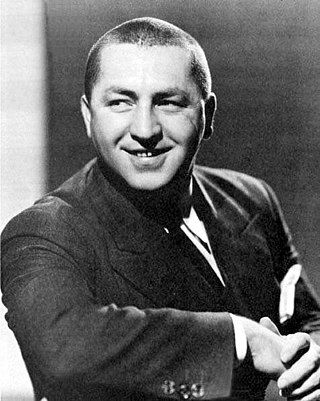
Jerome Lester Horwitz, better known by his stage name Curly Howard, was an American comedian and actor. He was a member of the comedy team The Three Stooges, which also featured his elder brothers Moe and Shemp Howard, as well as actor Larry Fine. In early shorts, he was billed as Curley. Curly Howard was generally considered the most popular and recognizable of the Stooges.

Have Rocket, Will Travel is a 1959 American science-fiction comedy film released by Columbia Pictures and starring the Three Stooges, consisting of Moe Howard, Larry Fine and new addition Joe DeRita. The film was produced to capitalize on the Three Stooges' late-1950s resurgence in popularity. The supporting cast features Anna-Lisa and Robert Colbert.
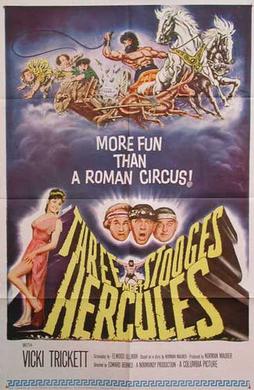
The Three Stooges Meet Hercules is a 1962 American comedy fantasy film directed by Edward Bernds. It is the third feature film to star the Three Stooges after their 1959 resurgence in popularity. By this time, the trio consisted of Moe Howard, Larry Fine, and Joe DeRita. Released by Columbia Pictures, The Three Stooges Meet Hercules was directed by long-time Stooges director Edward Bernds. It was the most financially successful of the Stooges' feature films.

Woman Haters is a 1934 musical short subject directed by Archie Gottler starring American slapstick comedy team The Three Stooges. It is the inaugural entry in the series released by Columbia Pictures starring the comedians, who would ultimately star in 190 short subjects for the studio between 1934 and 1959. This short is known to be the first program shown on Antenna TV, a channel that was launched on January 1, 2011, by Tribune Broadcasting.

Hello Pop! is the third of five short films starring Ted Healy and His Stooges released by Metro-Goldwyn-Mayer on September 16, 1933. A musical-comedy film, the film also featured the Albertina Rasch Dancers and Bonnie Bonnell. The film was considered lost until a 35mm nitrate print was discovered in Australia in January 2013. Stooges Moe Howard, Larry Fine and Curly Howard were billed as "Howard, Fine and Howard."
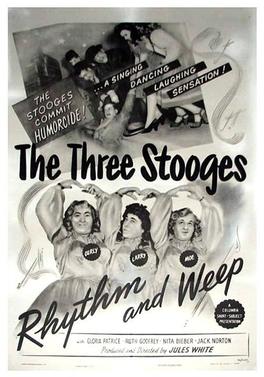
Rhythm and Weep is a 1946 short subject directed by Jules White starring American slapstick comedy team The Three Stooges. It is the 95th entry in the series released by Columbia Pictures starring the comedians, who released 190 shorts for the studio between 1934 and 1959.

Hoi Polloi is a 1935 slapstick comedy short subject directed by Del Lord starring American slapstick comedy team The Three Stooges. It is the tenth entry in the series released by Columbia Pictures starring the comedians, who released 190 shorts for the studio between 1934 and 1959.

Slippery Silks is a 1936 short subject directed by Preston Black starring American slapstick comedy team The Three Stooges. It is the 19th entry in the series released by Columbia Pictures starring the comedians, who released 190 shorts for the studio between 1934 and 1959.
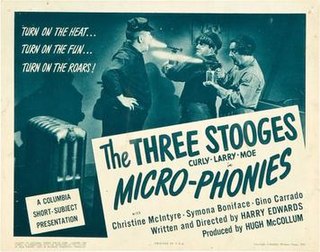
Micro-Phonies is a 1945 short subject directed by Edward Bernds starring American slapstick comedy team The Three Stooges. It is the 87th entry in the series released by Columbia Pictures starring the comedians, who released 190 shorts for the studio between 1934 and 1959.

A Bird in the Head is a 1946 short subject directed by Edward Bernds starring American slapstick comedy team The Three Stooges. It is the 89th entry in the series released by Columbia Pictures starring the comedians, who released 190 shorts for the studio between 1934 and 1959.
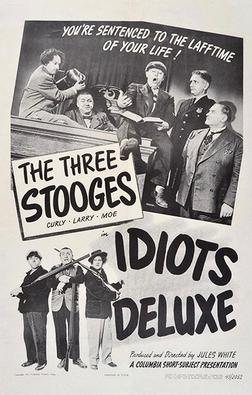
Idiots Deluxe is a 1945 short subject directed by Jules White starring American slapstick comedy team The Three Stooges. It is the 85th entry in the series released by Columbia Pictures starring the comedians, who released 190 shorts for the studio between 1934 and 1959.

Stop! Look! and Laugh! is a 1960 feature-length Three Stooges compilation film featuring Moe Howard, Larry Fine, and Curly Howard in scenes from 11 movie short subjects of 1937–1947. Additional footage, filmed especially for this production, features ventriloquist Paul Winchell and his dummies Jerry Mahoney and Knucklehead Smiff, and animal act The Marquis Chimps.
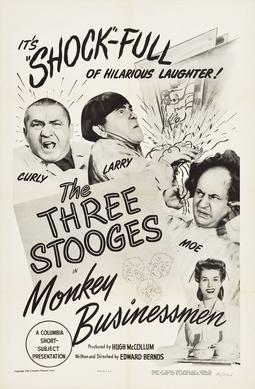
Monkey Businessmen is a 1946 short subject directed by Edward Bernds starring American slapstick comedy team The Three Stooges. It is the 92nd entry in the series released by Columbia Pictures starring the comedians, who released 190 shorts for the studio between 1934 and 1959.

Three Loan Wolves is a 1946 short subject directed by Jules White starring American slapstick comedy team The Three Stooges. It is the 93rd entry in the series released by Columbia Pictures starring the comedians, who released 190 shorts for the studio between 1934 and 1959.

G.I. Wanna Home is a 1946 short subject directed by Jules White starring American slapstick comedy team The Three Stooges. It is the 94th entry in the series released by Columbia Pictures starring the comedians, who released 190 shorts for the studio between 1934 and 1959.

Three Little Pirates is a 1946 short subject directed by Edward Bernds starring American slapstick comedy team The Three Stooges. It is the 96th entry in the series released by Columbia Pictures starring the comedians, who released 190 shorts for the studio between 1934 and 1959.

Star Spangled Salesman is a 1968 short film produced by the U.S. Department of the Treasury to promote the sale of Savings Bonds.

The Three Stooges Scrapbook is an unaired 1960 television miniseries starring The Three Stooges. In the opening title and Hollywood trade advertisements, the show's title is spelled without "The," including a promotional photograph of the Stooges holding an oversized scrapbook. The first episode's plot finds the men evicted from a rooming house and finding refuge in the home of a mad inventor. The second and final episode features the trio presenting an animated short called The Spain Mutiny that imagines them as part of Christopher Columbus’ crew.




















